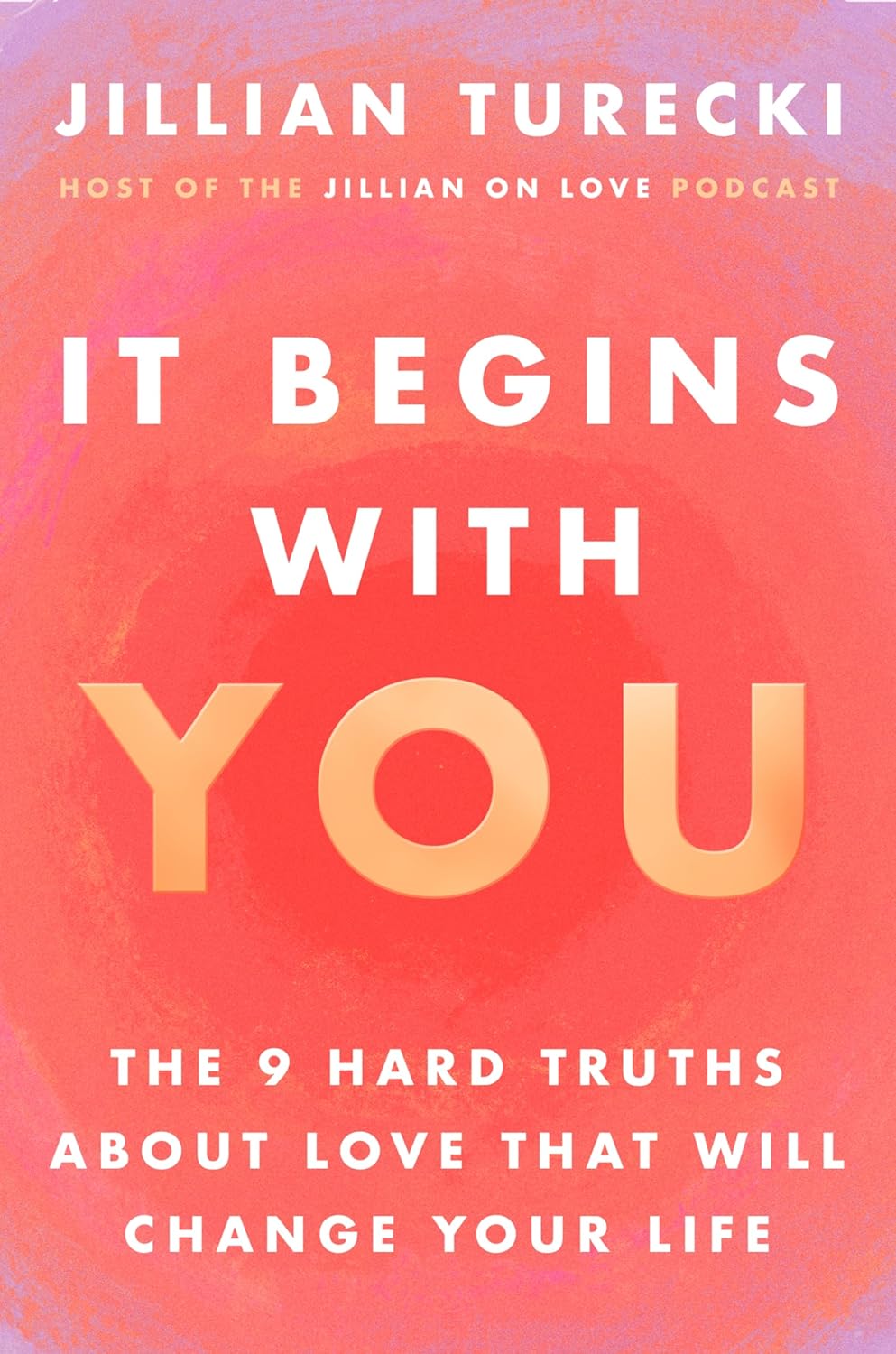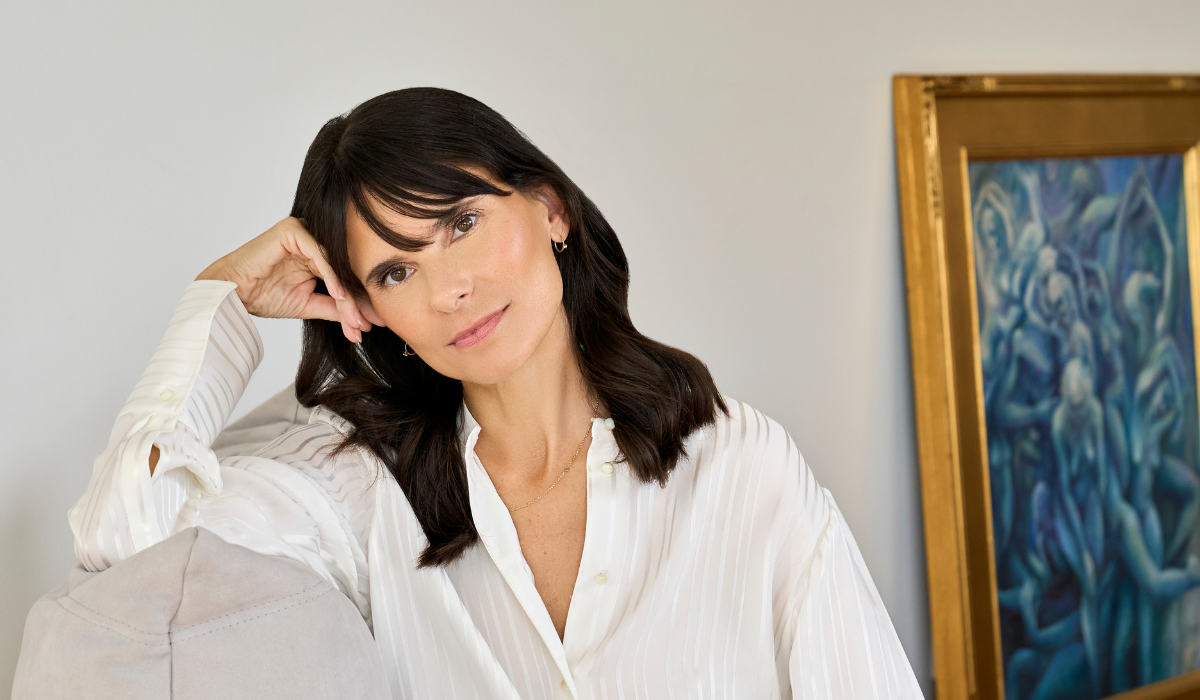Want to Improve Your Love Life? Relationship Coach Jillian Turecki on Exactly Where to Start
If we want something in our lives to change, we have to be that change.
It's a simple concept that can be the hardest to follow. But as Jillian Turecki has exemplified, after experiencing gut-wrenching heartbreak and becoming a globally sought-after relationship coach, how we want to live and the love we want to experience is within our reach. We just have to look inside ourselves first.
Turecki has shed light on this truth for her clients and millions of followers for two decades. Now, she's compiled her experience helping people heal themselves and their relational lives in her debut book, It Begins With You: The 9 Hard Truths about Love that Will Change Your Life.
We recently chatted with Turecki, who spoke to us about what we're not taught about love, the one element of relationships we all struggle with, and the critical key to opening our hearts.
A CONVERSATION WITH JILLIAN TURECKI
In our culture, we don't get an education on how to help our relational lives thrive. What skills do you believe we need but aren't taught?
We're not taught how to build self-awareness, compassion, and empathy. We're not taught how to communicate in an effective way that yields repair and emotional intimacy. We're not taught that our childhood will show up in adulthood, and most specifically, in our romantic relationships, and how to navigate all that.
It all boils down to a value system, which is the quality of our relational life—and this goes with romantic relationships, family, and friendships— really do determine the quality of our lives and well-being, probably more than anything else, because we are social animals. So, the fact that there isn't a curriculum that helps us build, repair, strengthen, and maintain relationships is tragic to me.
Let's zero in on the theme of your book, It Begins with You. Why is this the crux?
Something that I learned later in life is that we determine the quality of our lives through the meaning that we give things—through our habits and our beliefs. And if we want something to change in our lives, we have to be that change. And sometimes, that is just changing our perspective of what is externally happening that we have no control over, but [seeing that] we can control things internally.
Romantic relationships is where my focus has been. I believe that's where we struggle the most because it's where we are most vulnerable. It's where we are going to be confronted with our fears of abandonment, of not being loved, and of loss the most. So, I wanted to validate, normalize, and acknowledge how difficult it can be. If we struggle in any way in our romantic lives, the first place to look is within. We have to look at our choices, our childhoods, our beliefs. That gives people some empowerment: knowing that you can create change. Your past does not define you. Your childhood does not define you. And with certain skills and a shift in your thinking, you can create massive change in your life and then your love life. It begins with you.
In your book, you offer a story of one client who struggled with not feeling good enough for the love she desired. Why is understanding this and our self-worth such a catalyst for change?
It is understanding that it's the human condition. Not everyone struggles with feeling enough and worth the same. It does exist on the spectrum. Some people struggle with it a lot more than others, and some people struggle with it in certain areas and not others. Also, it's important that people recognize that at the core of your problems in your romantic relationships, if you peel away the onion, is a fear of not being enough. And that if you feel you're not enough, [you believe] somehow you will not get the oxygen that you need, which is love. I want people to understand that when you peel away at that onion, fear is at the core. When you get angry, it is fear. When you get sad, it is fear. It's all fear, and you're not unique in having that fear.
Knowing that helps you navigate relationships. Because if you're in a relationship with someone, whatever the nature of that relationship is, and they're starting to act in a certain way, it doesn't mean you need to tolerate it, but this at least gives you insight into knowing, Oh, they're afraid right now. They're afraid of losing something. They're afraid that they're not going to be good enough. That's why it's so incredibly important.
Your book outlines nine truths about love and one of those truths is that you have to love yourself. What does it look and feel like to really love ourselves?
It is a lifelong endeavor that we are tasked with as human beings. What it looks and feels like is: I accept myself and see myself as having value and being worthy in spite of the fact that there are parts to me that I don't particularly like. It's knowing: I have this, and I have that, but I'm lovable, and I'm worthy, and I'm deserving. It's learning how to live with one's ambivalence towards oneself and holding oneself in high esteem in spite of one's ambivalence.
It's also knowing that you have worth and value but must participate in life to really raise your self-esteem. You won't feel as good about yourself as you can if you're not living up to your potential. [Suppose] you're playing video games all day, underperforming at work, or living a life that is so rigid because you're attached to control and certainty that you're not exploring the things that give you meaning. In that case, you're never going to feel good about yourself. This might mean you need to explore therapy to help you understand why you're stuck in that rut. But I also take about climbing the mountain: We have to do hard things that challenge ourselves because that's part of raising self-esteem. We can't feel that good about ourselves if we're not overcoming something. We're designed to overcome obstacles. It's part of human nature.
What are some ways we can start climbing the mountain, as you say, to help us love and value ourselves?
They don't have to be life-altering things. These can be small things. You have to think about how it will feel once you do it. Attach some emotion to it. So think:
I would feel really proud of myself if I just did that. That would open things up for me. That would make me feel like I was courageous. That would give me some pride.
Many people don't create change until things get hard for them and they hit their bottom. The goal is to try to make changes in your life without you hitting a bottom. This is about reflecting on:
What do I need? Do I need more adventure in my life? Do I need more love? Do I need more community? Do I need to grow? What have I been putting off that if I were to do it, I would get many needs met, and it would feel like I'm growing?
It all boils down to how we're meeting our needs. So, if you are feeling stuck or low on yourself and can't figure things out, just ask yourself: What's really important to you now that you haven't been paying attention to? Then, start to brainstorm about how you can meet that need. For the person stuck in everything having to be exactly a certain way, maybe it is about thinking of one thing they can do every day that's a mini adventure. This will help them get out of a control rut.
When we do this, we start to feel more alive, and when we start to feel alive, we start to feel more connected to our surroundings and ourselves and the people around us. And guess what? We feel more whole, and our self-esteem goes up.
That is the education we need!
Yes! To bring this full circle to the first question, what we're not taught is resilience, reframing, and facing obstacles, and how we're built for that. And we're not taught how wonderful it is when we can overcome certain obstacles. Life is not always fun, and sometimes it is very hard. We feel like we have superpowers when we can move past that friction. That's an incredible skill that I hope parents teach their kids. That's really important, and it's ultimately what the book is about.

Jillian Turecki is a renowned relationship coach, teacher, author, and host of the podcast Jillian On Love. She has helped thousands over the last 20 years through her teachings, courses, and writing to revolutionize their relationship with themselves so that they transform their romantic relationships. Learn more at www.jillianturecki.com.
Please note that we may receive affiliate commissions from the sales of linked products.



